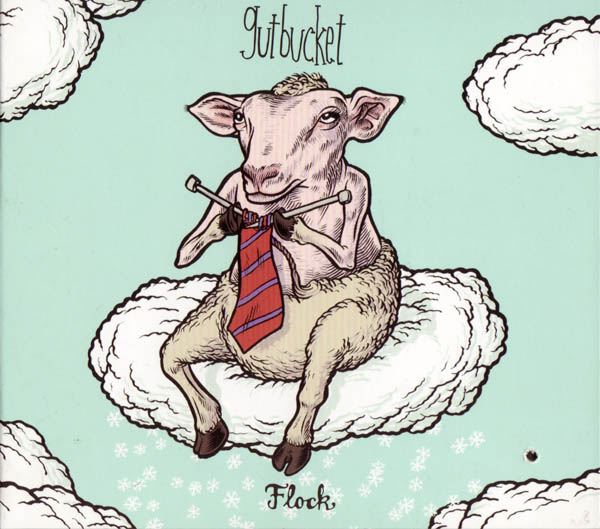
by Tim Owen
August 01, 2011
/ ALBUM
The sound of four talented musicians having a blast, putting a new spin on a sound they love.
Gutbucket
“Flock”
(Cuneiform)
Gutbucket have been around for a while now, twelve years, and “Flock” is their fifth album. They debuted on record in 2002 with the nicely titled “Dry Humping the American Dream”. Most Gutbucket titles imply a lively sense of humour and a mordant directness, and for good reason. “Flock” is a great album, and Gutbucket play a mean live show, as I can attest having caught them at the recent Blaze Festival in Dalston, London. They played a free gig at the Vortex, during which frontman Ken Thompson dedicated the album lead track “Fuck You and Your Hipster Tie” to a suitably attired member of the audience, then worried (unconvincingly) that he might have caused offence. I hope I can assume from this that Thompson has thick skin himself, because I’m going to harp on a bit about how much Gutbucket, and Thompson in particular, sound so very John Zorn. No-one likes to be compared directly to someone else, I know; but… just think what Zorn’s signature sound might be if it was reduced to its jazz punk essentials, and you’ll have Gutbucket in a nut shell.
Thompson’s main instrument is the alto saxophone. On the album he also plays soprano sax, baritone sax, clarinet, bass clarinet, and contrabass clarinet. He doesn’t always sound like Zorn on the alto, but he always does when he solos. He even does that signature Zorn trick of twist one leg up to plug the bell of his alto with a raised knee. He doesn’t wear a red T with Fuck You in bold type, as Zorn invariably does (or is that just when he plays to British audiences?) but he does wear the cargo pants. Maybe it’s a Brooklyn neighbourhood thing. Maybe Zorn and Thompson both live in the same neighbourhood; the one not populated by people in hipster ties. Elsewhere in the band, the presence and effect (though not directly the sound) of Gutbucket’s electric guitarist Ty Citerman mirrors the various roles Robert Quine, Marc Ribot, Bill Frisell, and others have played in Zorn’s music. He’s a versatile player, who also adds prepared guitar and electronics to the mix in the studio. Let me restate something: this is a great album. It’s the sound of four talented musicians having a blast, putting a new spin on a sound they love.
Gutbucket is blessed with four songwriters, which lends the group sound a good deal of variety, and their arrangements are invariably tight and effective. Two of Thompson’s three compositions, the aforementioned “Fuck You?” (I’m saying nothing; I don’t want to overdo it) and “d0g Help Us” (sic), are, perhaps unsurprisingly, heavily indebted to Zorn’s (ah; sorry) quick-splice post-modernist school of composition, with the electric guitar on “Fuck You?” explicitly echoing Zorn’s hardcore fixation. “d0g” is insistently, and rather magnificently aggressive, as it worries itself up to a hell of a climax. Thompson’s third composition, “Give Up”, is surprisingly, gently lyrical, though it does kick up a gear at the end. Ty Citerman contributes “Said the Trapeze to Gravity (Why Are You So Old?)”, “Murakami” and “Zero is Short for Idiot”. The latter has a very nice passage that could be by Tortoise if it were played on marimbas, and its more frenetic passages suggest later developments in post-rock, like the impacted angularities of Battles, perhaps. The turbulent aggression of “Said?” is offset by a funk rhythm, and rounded out with a coda that’s pure textural interplay. There’s actually much nuanced detail in these recordings. Bassist Eric Rockwin and drummer Adam D. Gold both play Wurlitzer on occasion, with Rockwin adding further touches of cello and bass synth.
Rockwin wrote “4 9 8” as well as the three tracks that make up the album-closing “Born Again Atheist Suite”. The first part of the suite’s middle movement, “Sacrificial Vegan”, roots the bands’ signature sound in the blues, much as ?70s classic rock bands rooted their own music in the blues. The album- and set-closing “Turning Manischewitz into Wine” (a reference to the Chicago indie band perhaps?) features a showcase solo by Thompson , which goes over great live, particularly when he does that knee-up thing. It concludes with a condensed summary of the full group sound, anchored by a mighty riff.
The surprise compositional turn, however, comes from the bands’ drummer, Gold, and his one contribution to the Flock songbook, “Tryst ?n Shout”. You can tell from the title that he’s not quite on the same wavelength as his band-mates, which turns out to be a good thing. At the album’s centre, “Tryst?” is where the textures open up and the Zorn effect is given shortest shift. The composition eases off on the punk attitude and frenetic stop/start momentum, so this is a key track in establishing Gutbucket’s originality. It’s also a clear highlight of the live show. A long solo feature for Ty Citerman allows him to unfurl his lines unhurriedly atop a backing of finely controlled group dynamics. In the end, it has to be said, Gutbucket are less in compositional hock to their influences than John Zorn often is. In concert they are infectious, dynamic, and hugely entertaining, and at its best “Flock” is a fine, tightly structured encapsulation of their live exuberance. A nice final touch is the art, the wit of the cover image being carried over and completed on the inlay, making an ironic statement (or ironically making a statement, perhaps) on originality.
blog comments powered by Disqus